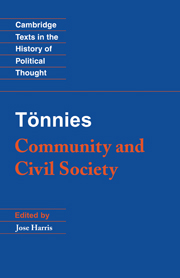Book contents
- Frontmatter
- Contents
- Acknowledgements
- General introduction
- Chronology of Tönnies's life and career
- A note on the texts and further reading
- A note on translation
- Glossary
- COMMUNITY AND CIVIL SOCIETY
- Book One A general classification of key ideas
- The argument
- Section 1 The theory of Gemeinschaft
- Section 2 The theory of Gesellschaft
- Book Two Natural will and rational will
- Book Three The sociological basis of natural law
- Appendix: Conclusions and future prospects
- Index
- CAMBRIDGE TEXTS IN THE HISTORY OF POLITICAL THOUGHT
The argument
Published online by Cambridge University Press: 05 June 2012
- Frontmatter
- Contents
- Acknowledgements
- General introduction
- Chronology of Tönnies's life and career
- A note on the texts and further reading
- A note on translation
- Glossary
- COMMUNITY AND CIVIL SOCIETY
- Book One A general classification of key ideas
- The argument
- Section 1 The theory of Gemeinschaft
- Section 2 The theory of Gesellschaft
- Book Two Natural will and rational will
- Book Three The sociological basis of natural law
- Appendix: Conclusions and future prospects
- Index
- CAMBRIDGE TEXTS IN THE HISTORY OF POLITICAL THOUGHT
Summary
The wills of human beings interact in many different ways. Every such relationship is reciprocal – on the one side active or assertive, on the other passive or acquiescent. These interactions are of such a kind that they tend either to support the mental and physical well-being of the other party or to destroy them – they are either positive or negative. My theory will concentrate on investigating only relationships that are based on positive mutual affirmation. Every relationship of this kind involves some kind of balance between unity and diversity. This consists of mutual encouragement and the sharing of burdens and achievements, which can be seen as expressions of people's energies and wills. The social group brought into existence by this positive relationship, envisaged as functioning both inwardly and outwardly as a unified living entity, is known by some collective term such as a union, fraternity or association. The relationship itself, and the social bond that stems from it, may be conceived either as having real organic life, and that is the essence of Community [Gemeinschaft]; or else as a purely mechanical construction, existing in the mind, and that is what we think of as Society [Gesellschaft]. If we look at the ways in which these two terms are applied we shall see that they are conventionally used in German as synonyms.
- Type
- Chapter
- Information
- Tönnies: Community and Civil Society , pp. 17 - 21Publisher: Cambridge University PressPrint publication year: 2001



